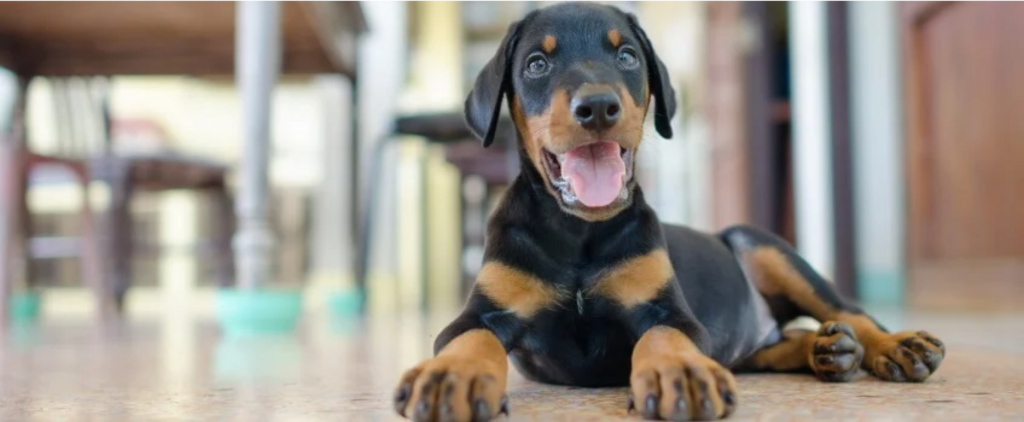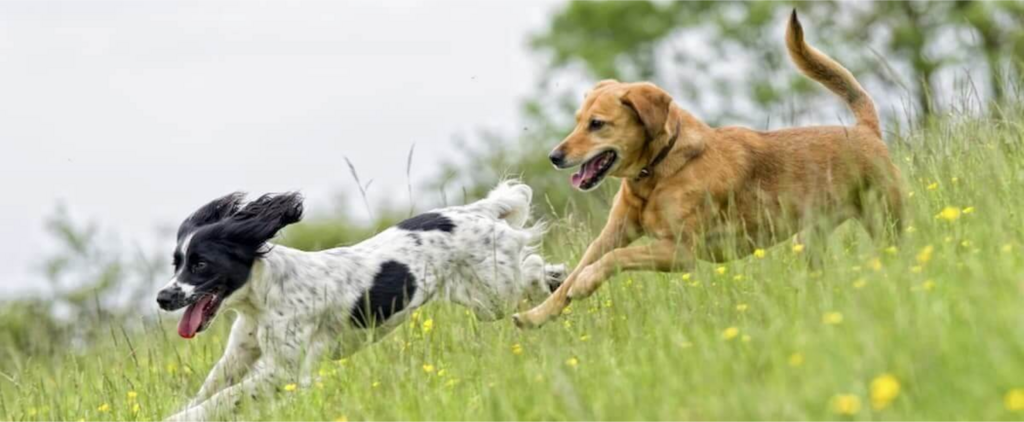Last Updated: 03/09/2025
Puppy Vaccination Guide
Give your puppy the best start in life. Learn all about what vaccinations they will need.
Author: Dr Carla Paszkowski BVSc (Hons)
Reading Time: 7 minutes - short read
Every year, countless puppies are at risk of contracting serious and potentially fatal diseases present in their environment. Without timely intervention, these diseases can wreak havoc on a puppy's health, leading to prolonged suffering and even untimely death.
By understanding and adhering to a comprehensive puppy vaccination schedule, you can arm your furry friend with the defense they need against these threats, ensuring they lead a healthy, long life by your side. Dive into our guide to safeguard your pup's future.
For info about puppy desexing, diets, worming, and more, check out Dr. Teagan's Complete New Puppy Guide. Don't forget, our Vet Squad are ready to help with any questions you have!
Why are puppy vaccines important?

Vaccination promotes long-term health
Vaccinating your puppy is one of the most important things you need to do in your first few weeks as a new puppy parent. Regular vaccinations throughout their life help puppies grow into dogs that remain free of infectious diseases, and also prevents them from passing nasty diseases on to other animals.
Puppies are particularly vulnerable
When puppies are born, they are protected by maternal antibodies (ie, the antibodies inherited through their mother). These antibodies wane around 8-14 weeks of age, which leaves the puppy highly susceptible to catching transmissable diseases. This means that compared to adult dogs, a puppy is more likely to catch a disease and is much more likely to die from it. Vaccination at this time helps the puppy to create their own antibodies, which builds up their immunity and protects them into adulthood.
Preventable diseases in dogs have not been eradicated
Despite prevention being available for decades, the diseases that puppy vaccines shield against are still prevalent today. Unlike some human diseases such as polio, the main vaccine-preventable diseases in dogs have not been eradicated and are very much present in unvaccinated populations of dogs. This means that your dog is at a very real risk of catching these diseases if they are not immunised, even in urban areas of Australia. Puppies can catch diseases from direct contact with other dogs, or exposure to contaminated surfaces in the environment.
Which diseases do puppy vaccines prevent against?

Puppy vaccinations can be broken down into 'Core Vaccines' and 'Non-Core Vaccines'. There are a couple of of other vaccines that your dog may receive in specific circumstances depending on their lifestyle and location.
1. Core Vaccines
Core vaccines are required for all dogs and puppies, regardless of location and lifestyle. They include:
- Parvovirus - a highly contagious and often deadly virus that causes vomiting, bloody diarrhoea, fever, and extreme dehydration. Puppies under 4 months are particularly vulnerable and often do not survive.
- Canine Distemper Virus - this virus attacks the respiratory, gatrointestinal and neurological system, causing discharges from the eyes and nose, fever, coughing, vomiting, diarrhoea, seizures, paralysis, and often death.
- Adenovirus (canine hepatitis) - a contagious virus that infects the liver, kidneys, spleen, lungs, and eyes. Symptoms are varied but can include fever, vomiting, jaundice, abdominal swelling and pain around the liver.
The core vaccines make up the 'C3' vaccination and are required to be given at the first vaccine, when the puppy is aged 6-8 weeks.
2. Non-Core Vaccines
Non-core vaccines are included in the 'C5' vaccination. The C5 vaccination includes the 'C3' core vaccines listed above, as well as the two extra non-core vaccines listed below. The C5 vaccine is given at 12 weeks and 16 weeks of age. Non-core vaccines are:
- Bordetella bronchiseptica
- Parainfluenza virus
'Kennel cough' (or 'infectious tracheobronchitis') is caused by the above two infectious agents. Kennel cough is a highly contagious disease that affects the respiratory system of dogs. It causes inflammation of the upper airways and causes bouts of harsh, dry coughing. It can sometimes cause gagging and vomiting, along with loss of appetite. It is most commonly transmitted in dog parks, boarding kennels, grooming salons, and day care facilities.
3. Other vaccines
There are a number of other vaccines that your pup may require depending on your location and lifestyle, including leptospirosis and rabies.
Do dogs in Australia need a leptospirosis vaccine? Leptospirosis may be a risk for dogs that visit high-risk leptospirosis areas and have access to stagnant bodies of water, or have contact with livestock or rodents. High-risk leptospirosis areas include parts of Sydney, Newcastle, South Coast, and surrounding areas. Talk to your vet to find out if your dog requires a leptospirosis vaccine.
Do dogs in Australia need a rabies vaccine? The rabies vaccine is generally only given if your dog is travelling overseas to a country that requires this. Australia is a rabies-free country, which means that dogs remaining in Australia do not require a rabies vaccine. If you are travelling overseas with your dog, speak to your vet about what vaccinations are required.
Puppy Vaccination Schedule in Australia
Vaccination schedules for puppies vary depending on which brand of vaccine your vet uses. But generally puppies have a course of 3 vaccinations, given 4 weeks apart. The following schedule tends to be the most common:
How many vaccinations do puppies need?
Vaccination schedules for puppies vary depending on which brand of vaccine your vet uses. But generally puppies have a course of 3 vaccinations, given 4 weeks apart. The following schedule tends to be the most common:
- 6-8 weeks: C3 Vaccination (Parvovirus / Canine Hepatitis / Distemper). This first injection is usually done by the breeder or rescue centre prior to you adopting your puppy.
- 12 weeks: C5 Vaccination (Parvovirus / Canine Hepatitis / Distemper / Bordetella bronchiseptica / Parainfluenza). This injection is usually the first one you'll need to organise at your new vet.
- 16 weeks: C5 Vaccination (Parvovirus / Canine Hepatitis / Distemper / Bordetella bronchiseptica / Parainfluenza). This is your puppy's final injection.
- 12-15 months: After their final puppy vaccination, your dog will require a booster approximately 1 year later, at the age of 12-15 months
- After this, your dog will require regular immunisations for life. Depending on which brand your vet uses, they may give your dog a C5 injection every year, or they may choose to give the C3 component every 3 years and the kennel cough vaccination yearly.
It's important to consult with your vet to determine a tailored vaccination schedule suitable for your puppy's breed, lifestyle and location.
Post-Vaccination Period

When can I take my puppy out after their vaccinations?
As hard as it may be, your puppy shouldn't be taken out to new places for 10-14 days after they completed their last vaccination at 16 weeks. Remember that vaccines take 1-2 weeks after the final injection to fully protect your pet.
Socialising your puppy before they're fully vaccinated
Socialisation is extremely important for puppies, particularly between the ages of 10-14 weeks. However, this period is smack-bang in the middle of their vaccination schedule, which means they aren't fully immunised and ideally shouldn't be going out in public or being exposed to potential infectious diseases. So how can you ensure your puppy is socialised without putting them at risk?
- DON'T: go to dogs parks, beaches, day care, boarding kennels, or grooming salons where adult dogs of unknown vaccination status may be
- DO: puppy school, or controlled doggy playdates in non-public locations. It's okay to mix with other puppies of known vaccination status, as they are all at similar stages of their vaccination schedule.
Annual Health Checks and Boosters
Once your dog is an adult, they will require an annual health check and booster (of some variety) every year. Health checks are very important as your vet may be able to detect underlying conditions before they start showing signs.
Important things that your vet will check each year include your dog's teeth, heart, ears, skin, respiration, body condition, temperature, as well as their neurological and musculoskeletal systems. They will also be happy to discuss diet, flea and worming, training and behaviour with you.
Yearly vs 3-Yearly Dog Vaccines?
When your dog has entered adulthood, your vet may recommend one of the following regimes:
1. A C5 vaccine given every year, OR
2. A C3 vaccine given every 3 years, combined with the kennel cough vaccine given yearly.
Research conducted into the immune systems of our pets and the risks and benefits of vaccination demonstrated that antibodies from the 'Core' C3 vaccines tend to last 3 years, whereas the 'Non-Core' kennel cough antibodies last 1 year. Thus, the Australian Veterinary Association (AVA) and the World Small Animal Veterinary Association (WSAVA) recommend the use of a three year schedule.1
However, because the yearly C5 injection does no harm, your veterinarian may choose to deliver this to ensure no boosters are missed.
FAQ
As complicated as the vaccination schedule may appear, remember that your vet is there and will be happy to guide you every step of the way. By completing your puppy's full vaccination schedule, you can give your fur baby their best chance at leading a healthy, long, and happy life by your side.
If you have any questions about your puppy's vaccination schedule, our Vet Squad are here and ready to help with any questions you may have!
History
Our experts continually monitor the health and wellness space and we update our articles when new information becomes available.
Tue 2 Sep 2025
Edited by Dr Gillian Hill BVSc (Hons)Dr Carla Paszkowski BVSc (Hons)
Veterinarian
Dr. Carla graduated from the University of Queensland in 2013 with a Bachelor of Veterinary Science and worked for a number of years in small animal clinics across South East Queensland. While Carla enjoys most facets of clinical veterinary work, she holds a special passion for feline medicine, pocket pets, and nutrition.





